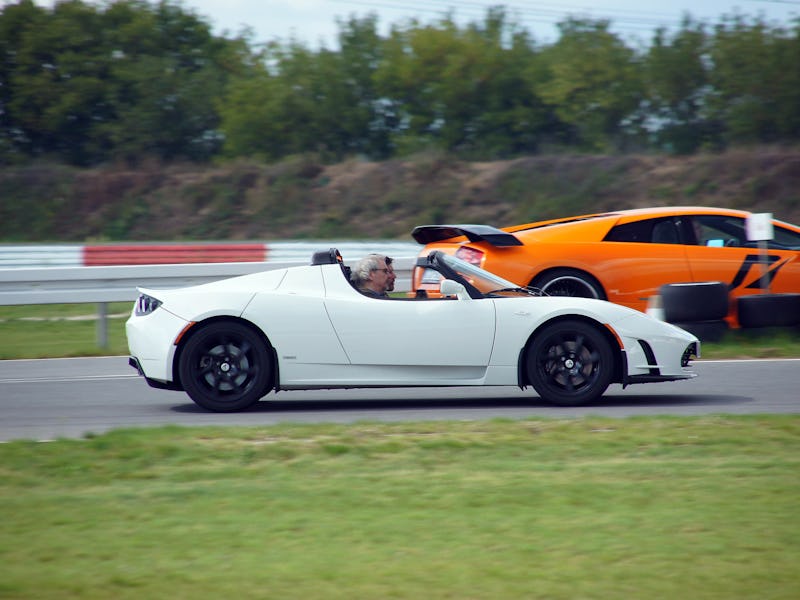How Fast Will Autonomous Cars Go? 200 MPH
In the future, autonomous car speed will be limited by closeness to pedestrians.

Transportation of the future is swiftly becoming epic — we could travel across the country in pods that whoosh through a vacuum tube, or be chauffeured around by a car without a steering wheel. And while the hyperloop is working out the kinks in its plan to go 800 mph, it’s hard to know how fast self-driving cars will be in the future.
“If it were all autonomous on a motorway, I think 200 mph isn’t too much to expect,” Greg Votolato, a design history expert and tutor at the Royal College of Art Vehicle Design program, tells Inverse.
We’re still working up to that level of autonomy, but the trick here is that the cars on a fully-autonomous highway aren’t reliant at all on human interaction to zip along. As soon as you throw in pedestrians, or cars that are still driven by people, the question becomes more complicated. Our autonomous future could feature a mix of superfast highways and trundling city cars – but still get you to your final destination faster than you can now.
“I think there is going to be some push and pull of how autonomous vehicles behave within cities,” says Erick Guerra, a professor of city and urban planning at the University of Pennsylvania. “I think at the beginning they are going to be very conservative.”
This conservative early speed is based on what happened when the first cars were introduced into cities. Between the new technology and everyone being basically amateur drivers, it was a disaster, says Guerra. “They were killing tons of people.” It was so bad that there was a movement to reduce the speed of cars – even mechanically if necessary. Instead, we got speed limits.
So now, although we have street cars that can go 216 mph, speed in cities hasn’t actually changed that much in the last hundred years. “It’s not noticeably different than in the 1900s when there was a horse at the front,” Votolato says. And even without human drivers behind the wheel, the unpredictable human element of car speed is evident in full force in cities full of pedestrians.
You can keep people from driving, but this is a nightmare scenario for that self-driving car A.I.
Thinking about this, Guerra brings up the morality scenarios for autonomous cars – absurd questions, he says, like does your autonomous car kill the schoolchildren crossing the mountain road or drive off the cliff and kill you? He says, “deciding whether the car is going to go 20 mph or 30 mph is going to have a lot more impact on total deaths than ‘do I run over the schoolchildren or do I drive over the side of the cliff,’ which will probably never come up.”
“In an environment with a lot of pedestrians, speed really kills,” Guerra says. And the difference between 20 and 30 miles an hour is significant for public safety. So the speed of autonomous cars in pedestrian areas will be based on the fact that human pedestrians are unpredictable for autonomous systems to predict. Autonomous cars will still be able to get you around faster in cities, says Guerra, by being smarter about taking untrafficked, odd routes. And it’s possible this could happen with cars driving even slower than cars in cities do today, he says.
Autonomous cars can navigate complicated courses quickly, so long as there are no surprises.
“Speed is interesting in general, it’s coming down everywhere,” Votolato says, pointing out that only things like high-speed trains are actually going faster, but cars, boats, and planes have changed very little. In Brighton, where Votolato lives, he says that he sees sports cars being used as props for dates, but there are too many traffic cameras for people to actually zip around. “People seem as happy doodling along at 12 miles per hour,” says Votolato with a laugh.
Outside of cities in the immediate future, Guerra says, “I wouldn’t be surprised if we saw dedicated lanes, for fully autonomous and highly connected cars, that can kind of space really closely.” Dedicated, compact lanes could allow drivers to get places faster without upping the speed limit, Guerra points out. He is also a little less optimistic about superfast autonomous cars in the distant future. “I’m not sure the speeds will be that much faster on a highway. Maybe eventually they’ll go faster. At first, I think the real goal will be to increase capacity.”
However, Votolato definitely can imagine an IRobot style highway, with cars cruising at hundreds of miles an hour – once all cars are autonomous. “Speed is part of the mythology of the car,” Votolato says. Whether we need super-speed for transport or not, people are still chasing that feeling of acceleration, and autonomy is unlikely to take that away.